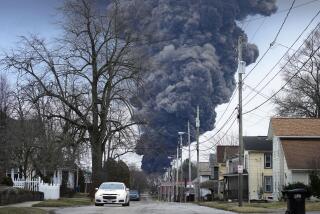Union Carbide Fined $3.9 Million; It Failed to Report Cancer Risk
- Share via
WASHINGTON — Union Carbide Corp., still reeling from last December’s toxic-gas disaster in Bhopal, India, was assessed a $3.9-million federal fine Friday after failing for four years to disclose evidence that another of its chemicals causes cancer in laboratory animals.
The Environmental Protection Agency said Union Carbide waited until September, 1983, to notify the agency of a 1979 study indicating that diethyl sulfate, a compound used to make dyes, drugs and textile finishing compounds, causes skin cancer in laboratory mice.
The agency called the failure a “clear violation” of a 1976 law requiring immediate disclosure of any evidence that a chemical poses a risk of “significant adverse health effects.”
‘Well-Founded Decisions’
“Delays in the reporting of substantial risk information seriously jeopardize the government’s ability to make well-founded regulatory decisions necessary to protect health and the environment,” said John Moore, the EPA’s top pesticides and toxic substances regulator.
It was not clear whether Union Carbide is accused of deliberately hiding the cancer data or merely overlooking the requirement that it be promptly disclosed but “it’s the responsibility of industry to know what’s in these statutes and to abide by them,” EPA spokesman Dave Ryan said, “and they didn’t do it.”
At Union Carbide’s Danbury, Conn., headquarters, spokesman Ed Vandenameele said the company had told the EPA it saw “no basis for the action.” The information did not have to be reported because the National Institute for Occupational Safety and Health listed the chemical as a suspected cause of cancer in 1976, the spokesman said.
Used in Factories
Diethyl sulfate is used only to make other chemicals in factories and there is “practically no consumer exposure and little worker exposure” at the small number of plants where the compound is used, Ryan said. Between 1.25 million and 12.5 million pounds were used in 1977, the last year for which the EPA has production data.
The chemical is unrelated to methyl isocyanate, the corrosive liquid that boiled out of a Bhopal pesticide plant last December, killing more than 2,000 persons.
Diethyl sulfate has long been known to be toxic, the EPA stated, but it had not been linked to cancer until Union Carbide asked the Carnegie Mellon Institute of Research to conduct laboratory tests of the substance in 1976.
The study’s initial results indicated in 1977 that laboratory mice whose skin was painted with diethyl sulfate suffered a high rate of cancerous tumors. Final results of the study were given to Union Carbide in 1979, the EPA claimed, but were not turned over to the agency until September, 1983.
The 1976 Toxic Substances Control Act requires companies to report such evidence immediately.
The $3.9-million penalty is the largest ever levied for failure to report the dangers of a chemical, but steeper fines have been assessed for other violations of the 1976 law, Ryan said.
More to Read
Inside the business of entertainment
The Wide Shot brings you news, analysis and insights on everything from streaming wars to production — and what it all means for the future.
You may occasionally receive promotional content from the Los Angeles Times.










